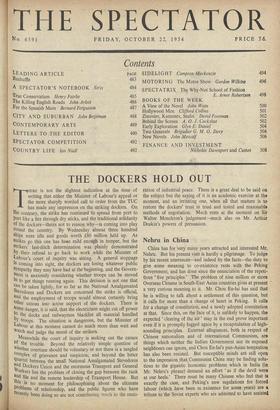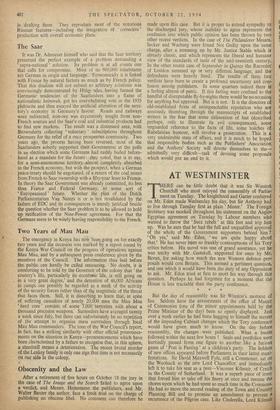Nehru in China
China has for very many years attracted and interested Mr. Nehru. But his present visit is hardly a pilgrimage. To judge by his recent utterances—and indeed by the facts—the duty to give some meaning to co-existence rests with the Peking Government, and has done since the enunciation of the repeti- tious ' five principles.' The problem of nine million or more Overseas Chinese in South-East Asian countries gives at present a very curious meaning to it. Mr. Chou En-lai has said that he is willing to talk about a settlement of this question, but it calls for more than a change of heart in Peking. It calls for a change of constitution, and a newly adopted constitution at that. Since this, on the face of it, is unlikely to happen, the expected clearing of the air' may in the end prove important even if it is promptly fogged again by a recapitulation of high- sounding principles. External allegiances, both in respect of Chinese nationalism and of international Communism, are things which neither the Indian Government nor its exposed neighbours can ignore, and Chou En-lai's pan-Asian temptation has also been resisted. But susceptible minds are still open to the impression that Communist China may be finding solu- tions to the gigantic economic problems which in India (in Mr. Nehru's phrase) demand an effort as if the devil were at our heels.' There must be many Chinese who feel that is exactly the case, and Peking's new regulations for forced labour (which have been in existence for some years) are a tribute to the Soviet experts who are admitted to have assisted in drafting them. They reproduce most of the notorious Russian features—including the integration of corrective' production with overall economic plans.



































 Previous page
Previous page